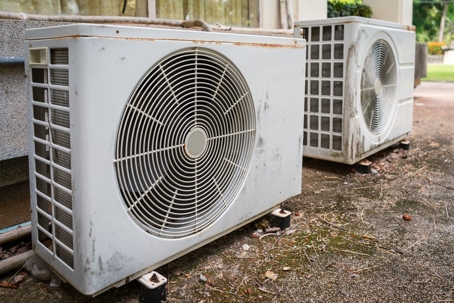How Your Heating And Cooling System Impacts Air Quality
An old HVAC system may contribute to poor air quality through the accumulation of dust, mold, and other pollutants that can circulate throughout your home. These contaminants can cause allergic reactions, respiratory issues, and other health problems. Itandrsquo;s important to realize that itandrsquo;s not just about the temperature - itandrsquo;s also about the air you inhale every second.
We often donandrsquo;t think much about the air inside our homes. However, if your home is equipped with an older HVAC system, itandrsquo;s worth considering its impact on your indoor air quality.
Keep reading to learn more about the signs that your air quality is suffering and whether your HVAC system is the culprit.
Signs of Poor Indoor Air Quality
Indoor air quality issues may arise from various sources, not just your heating and cooling systems. Homeowners should be vigilant about any unusual changes in their indoor environment and work to determine the source of the issue.
Common signs that air quality is suffering include:
- Unpleasant odors that linger or a musty smell indicating mold growth
- Visible dust build-up on vents and surfaces soon after cleaning
- An increase in allergy symptoms such as sneezing, coughing, and itchy eyes while indoors
- Humidity issues: either too high, causing a feeling of dampness, or too low, leading to dry skin and irritation
- A noticeable difference in air quality in different rooms – some rooms feel stuffier than others
- Frequent headaches or fatigue may suggest the presence of carbon monoxide or other pollutants
- The occurrence of mold spots on walls or ceilings, especially near air vents
It's essential to consider all potential contributors to ensure the health and comfort of your indoor environment, including:
- Inadequate ventilation leading to insufficient exchange of indoor and outdoor air
- High humidity levels, which can promote the growth of mold and mildew
- Emissions from household cleaning products, paints and varnishes
- Off-gassing (the emission of especially noxious gasses) from new furniture, carpets, and building materials
- Combustion by-products from stoves, heaters and fireplaces
- Dust and pet dander accumulation in carpets and upholstery
- Pollen and other allergens that enter through open windows or on clothing and shoes
How to Know the Culprit Is Your HVAC System
Your HVAC system could be a primary reason for compromised indoor air quality. Also, if your home contains combustion-based appliances like space heaters, gas ranges and ovens, furnaces, gas water heaters, gas clothing dryers, wood or coal fireplaces and stoves, a well-functioning HVAC is crucial to venting potentially harmful by-products, which might not occur efficiently with an aging system.
As the system ages, the filters within may become less efficient, allowing dust, pollen, and pet dander to slip through and circulate in your home. An older HVAC system may also have compromised ductwork that harbors mold and mildew, especially if there's been any moisture intrusion or if high humidity levels are not controlled. Furthermore, outdated systems may not adequately handle the exchange of indoor and outdoor air, failing to flush out pollutant-laden indoor air and replace it with cleaner outdoor air.
The best way to determine if your HVAC system is why your air quality has dropped is to schedule a professional inspection with Valley Heating, Cooling, Electrical, and Solar.
Updating Your System - What to Replace?
When considering whether to update your HVAC system, itandrsquo;s essential to first understand what is most impacting your air quality and which parts may need replacement. If you're considering a new HVAC system because of air quality issues, we encourage you to discuss your options with one of our air quality experts at Valley. We can help you determine the best action to improve air quality and ensure efficient HVAC operation.
The average lifespan of your main HVAC components is as follows:
- Air Filters: Should be replaced every three to four months, as they directly affect your air quality. More frequent replacement may be beneficial for those with pets or respiratory conditions.
- The Furnace: This can last up to twenty years, but monitor it for reduced efficiency or strange sounds.
- Air Conditioner: Typically, air conditioners should be considered for replacement every fifteen years.
- Thermostat: Thermostats typically last ten years or longer. However, upgrading to a smart thermostat can significantly improve your control over the systemandrsquo;s efficiency and consequently, your air quality.
Ongoing Maintenance is Key
If you're struggling with poor air quality, but your HVAC system isn't ready for replacement, it could just need professional servicing. Remember, regular maintenance, such as replacing filters, cleaning ducts, and ensuring your system has the correct refrigerant levels are tasks you can manage with the help of the team at Valley.
Routine professional checks can help identify potential problems before they worsen. Additionally, regular tune-ups can extend the life of your HVAC system and enhance your home's air quality. Our HVAC specialists can also help you select any add-on features you may want, including air cleaning and purification systems, all designed to help improve the comfort and quality of your home's atmosphere.
If you are concerned about either the operation of your HVAC system or you've noticed a negative change in your home's air quality, contact the NATE-certified HVAC experts at Valley. We are always here to help.

